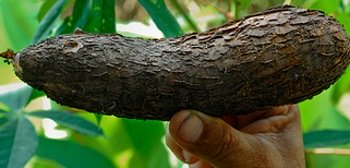Cassava is woody shrub with edible root that serve as food to more than a billion persons worldwide. In recent years it has gained much popularity and acceptance as more are turning to cassava root and its flours to meet their dietary needs.
Cassava

Cassava is a perennial woody shrub that is cultivated in the tropics, Nigeria being the world’s largest cultivator of cassava. Its starchy edible roots make it rank as one of the most important sources of carbohydrates in the world. It has a somewhat conical shape; average root tuber could be between 10-15cm long. Its outer color usually light brown or dark brown. You may find some with yellow skin though. The inner edible bit could vary according to species from white, cream, yellow or pink. Its Botanical name is Manihot esculenta.
Cassava is sometimes called yuca which could be misleading as yuca is an entirely different shrub. Other names for this tuberous root are: manioc and mandioca and Brazilian arrowroot.
In Africa, where it is a popular staple, the root is called Meidaka in Southern Nigeria by the Itsekiris and Urobhos, akpu or ugburu by the Igbos of Eastern Nigeria, banku in Ghana, and mogo in Central Africa. Other places where cassava is eaten is the Caribbean and South America but African is where the largest cultivation occurs with an estimated 102.6 million tones produced in Africa yearly.
Apart from the tubers, the leaves of this plant is also dried and eaten as a vegetable.
Cassava is the third most popular source of carbohydrate worldwide after rice and wheat. This crop grows in poor soil condition, and is quite resistant to droughts and plant infections. It is easily a natural alternative to rice and other expensive source of carbohydrate.
This tuber along with maize or corn, yam, plantain, cocoyam, rice, millet, barley and wheat constitutes over 90% of staples eaten in Africa.
Nutritional Value Of Cassava
Cassava is very high in carbohydrates and contains a very small fraction of protein, dietary fiber, sugar, calcium, phosphorus p, magnesium, iron and traces of vitamin A, E, D and K.
The leaves of this plant is also rich in protein and vitamin C.
Uses and products
The root tuber can be boiled, fried, mashed or pounded like yam or potatoes.
The most popular product from cassava is garri. The tuber is dried, grated and fried in a very intense process. Palm oil is sometimes added and garri is made into eba a kind of fufu served with stews and various sauces.
Another popular product is tapioca which is a starchy extract from the root processed through washing and crushing to get out a liquid that is then dried and grinded into tapioca flour. The entire root can also be processed into a nuttier flavored flour as well.
Cassava is gaining worldwide popularity and acceptance especially amongst those on restrictive diets like gluten free, nut free or grain free diets who sought cassava flours to replace wheat flour.
The starchy root tuber is first dried grated and processed into flour which for many recipes that calls for wheat flour, cassava flour can be substituted with a 1:1 ratio sometimes. At other times, you may need less of the cassava flour as its starchy nature makes it absorbs more liquid. You need to try it out a few times using known recipes until you get the right amount of the flour to use. I would be posting recipes for cassava bread and pastries in the future so signup for my newsletter, so you do not miss any.
Other uses of cassava includes as a livestock feed, in preparation of ethanol, adhesive gum, sweetners and monosodium glutamate.
Is It poisonous?
There are sweat and bitter cassava and both contain cyanogenic glycosides, the bitter containing more. However, proper processing and cooking eliminates this or bring it down to a safe level. So cassava must never be eaten raw.
Want regular updates on African cuisines and food recipes? What about unique health information about these foods - what to eat and avoid to keep healthy from the list of African recipes available?
Fill in the form below to subscribe to our Newsletter - AfricanFoods Weekly?
Worried about spamming? We are too. We will never ever give or pass on your information to anyone else. We will only use your email address to send you your copy of our weekly newsletter. We do have a zero tolerance to spam. We subscribe to a very strict policy on the handling and use of information we gather on this site! We also get paid for affiliate links on this site. See our privacy policy for further details.
Follow us on social media:
Get Our Weekly Newsletter. Subscribe Today. It's FREE.
Subscribe to African Foods Weekly
Get African food recipes, cooking tips, and healthy eating info delivered to your inbox every week. Simply fill in your email below and click SUBSCRIBE .
(Your information will not be shared)










New! Comments
Have your say about what you just read! Leave me a comment in the box below.